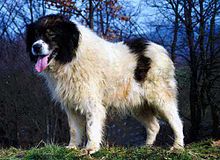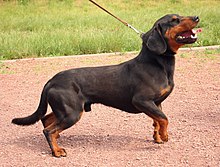
Hailing from the heart of Russia, the Russian Tsvetnaya Bolonka, often simply known as the Bolonka, is a toy breed that emerged as a symbol of aristocratic luxury during Tsarist times. With a name translating to “colored lap dog,” this breed boasts a curly, silky coat in a myriad of colors, setting it apart from many of its canine counterparts. Despite its diminutive size, the Bolonka is brimming with personality — a lively, affectionate companion that thrives in the company of humans and adapts effortlessly to city living.
The Russian Tsvetnaya Bolonka is a member of the AKC Miscellaneous Group.
Breed Characteristics
| Dog Breed | Russian Tsvetnaya Bolonka |
| Breed Popularity (AKC) | |
| Country of Origin | Russia |
| Personality | Friendly |
| Life Expectancy | 12-16 yrs |
| Height | 9-10 in |
| Weight | 4-11 lbs |
| Color | Sable, Black, Brown, Red, Grey, Wolfgraym, Fawn, Blue, Cream, Silver |
| Coat | Medium, wavy |
| Shedding | Infrequent |
| Grooming | 2-3 Times a Week Brushing |
| Health Problems | |
| Trainability | Agreeable |
| Exercise Needs | Regular Exercise |
Russian Tsvetnaya Bolonka History
Native to Russia, the Russian Tsvetnaya Bolonka, often simply known as the Bolonka, emerged as a popular toy breed during the Soviet era when importing small dogs was nearly impossible. Its name translates to ‘colored lap dog’ in Russian. This breed, with its curly coat and cheerful disposition, was developed primarily from various small breeds like the Bichon Frise, Toy Poodle, and Shih Tzu to be an ideal urban companion.
Temperament
The Russian Tsvetnaya Bolonka is a delightful little toy breed, known for its curly coat and cheerful disposition. Their behavior is friendly and adaptable, making them suitable for apartment living. With a relatively low energy level, they’re content with indoor activities. Their intelligence combined with their eagerness to please makes training fairly straightforward. They possess moderate barking tendencies, often vocalizing to get attention or express excitement.
Remember, while breed traits provide a general idea, individual dogs can have personalities that differ from the breed standard. Always spend time getting to know the dog and ensure their needs and temperament align with your lifestyle.
Grooming Requirements
The Russian Tsvetnaya Bolonka has a curly coat that demands consistent brushing to avoid mats. When bathing, a moisturizing dog shampoo is recommended to maintain the coat’s health. Essential grooming tasks, such as nail trimming and ear cleaning, should be part of their care regimen.
Russian Tsvetnaya Bolonka Health
The Russian Tsvetnaya Bolonka, with a lifespan of 12-16 years, is generally robust but may face minor breed-specific health challenges. Regular health checks, vaccinations, deworming, and flea prevention are necessary. A nutritious diet, ensuring balanced dog food, and monitoring for potential allergies, especially with new treats, is recommended.
Exercise Needs
Known for their cheerful personality, Russian Tsvetnaya Bolonkas thrive on regular walks and interactive play sessions. While they are adaptable to apartment living, playtime, including fetch, can help burn off their energy. Occasional trips to the dog park can provide socialization and a change of environment.
Training
Hailing from Russia, the Russian Tsvetnaya Bolonka is a delightful companion breed. Tailored obedience training suits their intelligent nature. Regular commands make potty training a smooth process. Crate training offers a secure haven, and addressing behavior problems like their occasional stubbornness is essential. Socialization from an early age ensures they remain amicable with other pets and people.
Russian Tsvetnaya Bolonka Pictures
Related Dog Breeds
More Dog Resources
Are you thinking about getting a puppy? Make sure to check out our list of important questions to ask before you adopt a puppy.
We also have many resources to help, from naming your puppy to socialization resources and training tips.
Take me back to the Ultimate Guide to Dog Breeds



